The Help Desk: Counter programming
Every Friday, Cienna Madrid offers solutions to life’s most vexing literary problems. Do you need a book recommendation to send your worst cousin on her birthday? Is it okay to read erotica on public transit? Cienna can help. Send your questions to advice@seattlereviewofbooks.com.
Dear Cienna,
My son hates to read. The rest of the family? That's all we do. We don't have a TV, even. The other five of us could pass every moment of every day with our noses in a book, but our son wouldn't read chocolate if it were a book. We bought him a computer, and he's getting pretty good at programming and really likes it, but I think he needs to let his eyes rest from all of the vibrating pixels every now-and-again. He thinks we're all (the wrong kind of) nerds, and wants us to learn more about the internet. What kind of compromise do you think we can find?
Georgia in Georgetown Heights
Dear Georgia,
<p class="noindent”>You can't force your loved ones to enjoy your hobbies – if that were possible, all of my friends would be wild about American Girl cosplay and farm-to-table spider farming. That said, if your son is programming, he is reading – you just don't get his language. <p class="noindent”>So buy him a few books that suit his interests and make a parental decree: Read for an hour, then your child can computer (and yes, you should definitely be letting him show off his internet skills). The method works: It's how I eventually weaned my cat off porn. <p class="noindent”>It's difficult to recommend specific books without knowing your son's age and abilities but Python for Kids: A Playful Introduction to Programming and 3D Game Programming for Kids: Create Interactive Worlds with JavaScript both come highly rated for kids 10+. If he's a little bit older, I'd throw in William Gibson's cyberpunk classic, Neuromancer. In fact, that might be a fun book to read and discuss as a family book club project, you nerds.Kisses,
Cienna
If you're a writer, you should apply for an Artist Trust Fellowship in the Literary Arts category. The deadline is January 11th.
Portrait Gallery: Patti Smith
Each week, Christine Larsen creates a portrait of a new author for us. Have any favorites you’d love to see immortalized? Let us know

Patti Smith talks about her new book M Train this Sunday at Town Hall. It’s sold out. If you didn’t get tickets, perhaps you could listen to Horses on repeat while watching Robert Having His Nipple Pierced. We do love Patti Smith.
Thursday Comics Hangover: Super women
In what could very possibly be some sort of a record, Marvel Comics this week published three first issues of three different series starring superheroes who are women. Even better, all three of them are great fun. They’re classic superhero comics; compelling stories about conflicted characters in outlandish situations.
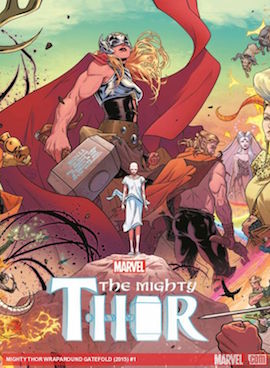
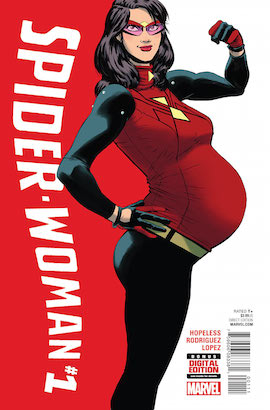
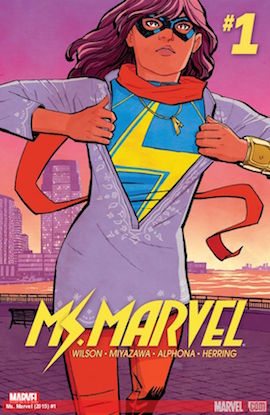
If you follow superhero comics, all three of these issues are worth your time. Perhaps most importantly, they’re not just comics about superheroes that have been gender-swapped; they’re comics about women with superhuman abilities, which presents a different palette than the standard male-oriented superhero comics. But while Marvel should be commended for producing so many new series starring female characters, the mastheads on these books identify that Marvel has not done as well with gender parity behind the scenes. Of the three writers and four artists on these issues, only one — Wilson — is a woman. Representation on the page is so important, but the comics industry has a long way to go before the creators are as diverse as the heroes they’re paid to create.
If you didn't watch the livestream, here's who won the National Book Awards this year:
YOUNG PEOPLE’S LITERATURE Neal Shusterman, Challenger Deep
POETRY Robin Coste Lewis, Voyage of the Sable Venus
FICTION Adam Johnson, Fortune Smiles
NONFICTION Ta-Nehisi Coates, Between the World and Me
Of course people have opinions about which books should have won. A lot of folks were pulling for Noelle Stevenson to win the young adult award with her comic Nimona, for instance. And the favorite to win the fiction award was Hanya Yanagihara's A Little Life. If you have any dobut about Yanagihara's genius, you should attend her reading at University Book Store this Friday, where she'll be interviewed by Shelf Awareness's David Wheeler. The reading is free.
Since you're not there (if you were, you woulndn't be reading this), you can live stream the 2015 National Book Awards Ceremony. Check it out on their site, and lay your bets now!
A Denver-area store called Isis Books & Gifts wants the world to know its name comes from the Egyptian goddess of healing and motherhood and it isn't run by terrorists.
Isis Books & Gifts has been vandalized five times in the last year, presumably because of, as Isis owner John Harrison told the Associated Press, "some ignorant people believing that somehow the terrorists have a store, a gift store, in the middle of Denver, Colorado."
The amount of stupid in America this week is truly staggering. This story came to me via the Idaho Statesman, which — gasp! — has "IS" in its name. Everybody riot!
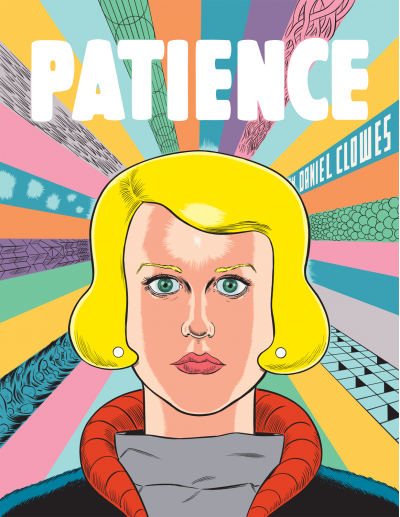
Yesterday, Seattle's own Fantagraphics Books formally announced Patience, the new graphic novel by Dan Clowes. It's the biggest original comic he's ever produced, and the description sounds fantastic:
Patience is an indescribable psychedelic science-fiction love story, veering with uncanny precision from violent destruction to deeply personal tenderness in a way that is both quintessentially “Clowesian,” and utterly unique in the author’s body of work.
I've always been a Clowes fan, but I think his best work skims the surface of genre — Ice Haven was a cross-disciplinary mystery novel, The Death Ray was a superhero comic riff. The fact that he's flirting with sci-fi again, for the first time since Like a Velvet Glove Cast in Iron, is a big damn deal. Patience will be released in spring of next year.
Sex and violence and the sex of violence
Published November 18, 2015, at 12:04pm
Two new comics offer completely different takes on the meaning and portrayal of hyper-violence.
The December issue of Details magazine will be its last, making the men’s fashion title the latest casualty of the declining print advertising market.
While I'm not going to shed a tear for Details — I haven't read a copy in at least a decade — this is not good news for writers. It's hard out there for freelancers, and only getting harder. Combine this with news that Gawker laid off writers yesterday in their ill-advised attempt to rebrand as a politics site and you've got another step forward in the consolidation of an already-rough market.
An interview with Steve Winter, bookseller at Ada's Technical Books
Ask Steve Winter how long he’s been in the bookselling business and he’ll tell you, “I’ve been saying 22 years for a couple years.” After a few short stints at bookstores in his native Michigan, Winter moved to Seattle and worked at Elliott Bay Book Company for ten years (where, full disclosure, he and I were coworkers) and at Third Place Books for eight years.
For the last two years, Winter has worked at Ada’s Technical Books for Ada’s co-owner Danielle Hulton, who claims less than a quarter of his bookselling experience. Winter loves the way Hulton has embraced bookstore ownership. “I think because Danielle has come into this as a relative outsider to the bookstore community, she didn’t have that perpetual doom and gloom that people in independent bookstores have had over the last 15 years, with the rise of the chains and online sales and Costco,” he says. He thinks her lack of experience at the outset proved to be a great benefit for Ada’s as they reinvented what a neighborhood bookstore could and should be. “Her energy plunging into the world of bookselling is fantastic.”
Of course, there’s something to be said for experience, too. Winter is one of the best handsellers I’ve ever worked with; when he’s passionate about a book (he specializes in sci-fi, though his interests are many and varied) he has been known to put dozens, or even hundreds, of copies in peoples’ hands over the course of a year.
What’s unique to Winter’s experience at Ada’s? Has working in a science bookstore been any different than working in a general-interest bookstore? “I’ve become friends with not one, but two astronomers” working at the bookstore, Winter explains. He’s learned a lot about astronomy from their conversations. “I even urged one of them [Dr. Sarah Ballard] to do an event here. She studies exoplanets, and she gave a great talk about inclusion and science.”
In addition, Winter has been adopting new interests through his job at Ada’s: “I found a new love of computer programming,” explaining that he's been working primarily with Python. When I respond to Winter’s announcement with the blank stare of a man who equates computer programming to wizardry, he clarifies. Python is “a very simple language recommended for beginners to programming, especially kids. It’s fairly straightforward and obvious.” But it’s not just kiddie-table stuff, Winter says. Python is used in “scientific applications, because it can crunch data really well. Both my astronomer friends have learned Python and use it a lot.”

Winter has also fallen in love with a new poster of the moons of Jupiter by Halfpence Design that Ada’s just started carrying. He embraces all the various ways the bookstore reaches out to people in an effort to make them feel welcome. “Part of Ada’s mission is to make science and technology accessible to all,” Winter says. It's a mission that makes him happy to be a bookseller.
James Bond needs to be bookish

James Bond films have never hewed too closely to Ian Fleming’s novels. Even the movies based directly on Fleming’s books, like Goldfinger, take many liberties with the plot and tone of the novels. This is perfectly fine; a movie is a movie and a book is a book. Bond films have developed their own language over the course of 50 years; they’re as distinct and self-referential as any film series in cinematic history. You won’t find Bond using many gadgets in the books, for instance, but it’s hard to imagine the cinematic Bond without a miniaturized blowdart in his watch or some other silly invention quite literally up his sleeve. So given that the Bond books and the Bond movies have such little in common, it might sound strange for me to say that Spectre, the new Bond movie, is missing a certain literary spirit. But I think that’s exactly the problem.
I’m a Bond fan; I’ve read every one of Fleming’s novels and I’ve seen all the films. Spectre is not the worst Bond film, but it’s in the bottom tier. It’s just a mess of a movie, all telling and no showing. The bad guy in the film tells Bond he’s responsible for every bad thing that happened in every other Bond movie of the last decade or so, but then he doesn’t produce any proof that this is the case. Likewise, a ridiculous connection between Bond and the villain is explained, but we’re never shown why it matters, or how they feel about that connection. The criminal organization in the title is introduced, but there are no real stakes. We know what they’re after, but we don’t know what they’ll do with it, or why they’d be any scarier than the omniscient, omnipotent, omnipresent threat they’re painted as being on their introduction in the film.
These are common problems with the modern Hollywood filmmaking-by-committee machine; scriptwriters get cause and effect mixed up, and so franchise movies tend to float on a cushion of hot air when they really need solid foundations. (Consider Star Trek Into Darkness or Amazing Spider-Man 2 or, to a lesser extent, Avengers: Age of Ultron or any of the other lackluster franchise movies of the past few years.) Bond movies, at their best, have always retained a literary sense of structure rather than the standard Hollywood three-act formula.
That literary structure is this: Bond chases a series of ideas around the planet, getting into scuffles along the way. Every stop leads to the next stop on the tour. There is an idea and a reason behind every scene in the film; every sentence spoken in a Bond film should be a propulsive plot element that sends the movie hurtling forward. Without that rigid structure, that literary understanding of cause and effect, you get a movie, well, that feels a lot like Spectre: aimless, shoddy, and painfully dumb.
I understand that the well is fairly dry in terms of Fleming’s source material. Most of those novels and stories have been strip-mined into movies already. That’s okay. All the producers need to do is to get a novelist, a good novelist, on staff. (Sebastian Faulks has already written one very good Bond thriller; he’d be perfect for the job.) Then they need to get the novelist to figure out the motivation of the bad guys, and then they need the novelist to reverse-engineer the chase that leads to the final confrontation. Is this so hard? You can’t just keep mining the nonexistent Bond backstory for more phony trauma; at some point, Bond has to do something. He’s a man of action, after all. More than that, he’s a man of literary action. It’s time to bring the books back to Bond.
Journey to prison island
Published November 17, 2015, at 11:54am
Mayumi is a woman in love. Mayumi is a married woman in love. Mayumi is a married woman in love with a 17 year-old boy. The more she confesses, the more you have to listen.
Time Capsule
They felt the wind on the down of their necks.
After the murders, children
in the town dreamed of housesmelting into the sky.
Fear built its hive inside them.But as they grew
their memories dwindledlike their bicycles that became too small to ride.
The graves
lay buried beneath the trees’shadows. Parents split
and moved away. One sister
survived. One witnessed the dark ceiling
of every midnightfall into her thoughts.
Reminders kept surfacing: a red bike
hooked to a chain link fence,a note folded in a pocket
and put through the wash
until she couldn’t read it, untilit was grit between her fingers. But
she knew — You will only be a ghostsliding through the trees.
This crumbling. Once upon a time
she sank her foot into the shoulder
of a shovel.
If you lost many tense hours worrying about international affairs over the weekend, this New York Times story about the election in Myanmar is a welcome reminder that sometimes good things do happen.
A great holiday story collection
You may or may not be ready for the holidays, but it's never the wrong time to read a great collection of themed stories. This week's sponsor Grey Sun Press offers just that with Joy to the Worlds: Mysterious Speculative Fiction for the Holidays.
It's a season's worth of cross-genre stories revolving around the legends and trappings of the Winter season holidays, by four accomplished local writers: Maia Chance, Janine A. Southard, Raven Oak, and G. Clemens.
They're throwing a bunch of parties around this book, and we have a full list on our sponosor page, as well as samples from four of the stories that appear in the book.
Grey Sun Press has partnered with us to get their work in front of your eyes. We think you'll love it, but with our sponsorship model, we offer you enough that you can make up your own mind. It's part of our campaign to make internet advertising 100 percent less terrible. Thanks for being a part of it with us.
Why a dog owner in Maine doesn't like David Sedaris
Last night, I had the pleasure of introducing David Sedaris at a sold-out reading at Benaroya Hall. This is the seventh time I've introduced Sedaris, and it's always a thrill. The best part of introducing David Sedaris is you get to hear him read after the introduction is done; he's simply the best reader I've ever seen. He'll be back in town next year on November 16th; I'll let you know when tickets go on sale. Here's my introduction from last night.
A few weeks ago, I happened across an article on the blog of a radio station from Maine. More specifically, the radio station is from a shithole town in Maine called Biddeford. I can call Biddeford a shithole town because it happens to be the town where my dad was born and raised. You should know that Biddeford is where Maine puts all the French Canadians, the professional workers' comp frauds, and the people who love alcohol more than they love their own toes.
Anyway, the blog post was titled “My Co-Worker Karen Had a Bad Encounter With Funny Man David Sedaris.” The post begins:
Karen has been a sales person here at the radio station for over 30 years and one of the nicest people you’ll ever meet. While recently attending a David Sedaris book signing, she got to meet the man himself… a one-on-one encounter with someone you’re a fan of … a great opportunity, most of the time.”
And then he quoted Karen’s Facebook page:
I attended the October 21, 2015 show in Portland, Maine. It was my third time seeing him in Portland. (now my last time seeing him). My first time at the book signing table. I was really looking forward to meeting him.
DS: “What’s your name?”
Karen: “Karen”
DS: “Do you have children?”
Karen: “I have a dog”
Okay, let me break into the story for a second, here, to insert a public service announcement. Ladies and gentlemen, I say this as someone with no children and no pets, so therefore I have no skin in this game. If someone asks you if you have children and you don’t have children, please don’t respond by saying that you have pets. It’s just not the same thing. I could go into elaborate detail about why this is, but it boils down to this: if you die in your easy chair of a heart attack on a Friday night, your children are probably not going to eat you by the time Saturday morning rolls around.
Anyway. Back to Karen’s Facebook page, where David Sedaris replies to the news that Karen is the proud parent of a dog:
DS: “What’s his name?”
Karen: “Cosmo”
DS: “How old?”
Karen: “He’s 12.”
DS: “Oh, he’ll die soon. Yes, he’s 12, he’ll die soon.”
"After the conversation," the blog post continues, Sedaris "proceeded to draw a gravestone on the title page of his book above his autograph with 'R.I.P. Cosmo' engraved on it." Sedaris then drew weeds on Cosmo’s grave "because she’d forget about him and get another puppy.”
The blog post ends, “She was shocked and pretty much speechless.”
Now, I don’t want to judge Karen from Maine, but I’m not sure who the hell she thought she was waiting in line to meet. Because that sounded pretty much like an ideal encounter with the David Sedaris I came here tonight to see.
They say that in the old days, court jesters were the only people who were allowed to tell kings the truth. They could point out that the king was mortal and would die one day without fear of decapitation, for example. This is a right and a privilege that we all extend to our comedians even today. And one of the best practitioners of this right is David Sedaris. But he understands that “you’re going to die one day” isn’t a very graceful punchline. His modernized versions of this ancient practice tend to be a little more indirect, referring instead to cold sores, or taxidermy, or dental surgery.
If you’re the kind of person who would get offended by a reminder that sometimes pets die, you might be in the wrong place. But if you do hear something tonight that makes you uncomfortable on a personal level, I want you to think about why you’re uncomfortable, and examine what you do with that discomfort. You might learn something valuable about yourself.
Anyone who’s met David Sedaris in the autograph signing line, or I guess I should say everyone who has met him in the autograph signing line except for Karen, knows that he is genuinely interested in people, and he’s glad to spend the time getting to know us. He responds to people with compassion, and curiosity, and kindness.
If you’re a fan of painfully funny stories rendered in meticulous, crystalline prose, you’re in the right room. We’re in this wonderful place to hear a very smart man tell us true things that are maybe so honest that we have no choice but to respond with laughter. You don’t need me to tell you that that makes tonight a very special night. So now that I’ve told you what you already know, let’s get on with it. Ladies and gentlemen, David Sedaris.
Your Week in Readings: The best literary events from Nov 16 - Nov 22
MONDAY Lyndon Johnson is perhaps the modern president who most lends himself to literary works. He’s appeared in Robert Caro’s ridiculously ambitious biographies, one of David Foster Wallace’s best short stories, and Robert Schenkkan’s incredible plays. But tonight, Betty Boyd Caroli looks at an under-appreciated side of the LBJ story in her book Lady Bird and Lyndon. Lady Bird Johnson could not have been a dull or unintelligent woman, but she’s gotten short shrift in most of the above-mentioned literary accounts. Caroli will be reading from the book at Town Hall Seattle tonight.
TUESDAY Elliott Bay Book Company hosts Michael Witwer, who will be reading from his new book Empire of Imagination: Gary Gygax and the Birth of Dungeons and Dragons. This is the first biography of Dungeons & Dragons inventor Gary Gygax, who has one of the all-time best names.
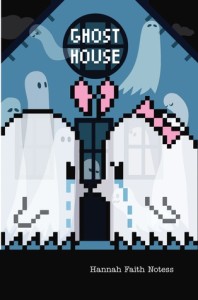
THURSDAY: The Northwest African American Museum hosts Lauret Savoy, whose book Trace: Memory, History, Race, and the American Landscape was called “a stunning excavation and revelation of race, identity, and the American landscape” by Terry Tempest Williams.
FRIDAY: It’s time again for the Hugo Literary Series at Hugo House. Like every entry in the series this year, writers will present new work based on a cliche. Tonight’s cliche is "Beggars can't be choosers.” The writers are novelist and essayist Leslie Jamison, the poet Roger Reeves, and Portland novelist Alexis M. Smith. YVES singer Susie Philipsen will also present new music on the theme.
SATURDAY: I suppose it’s time to start thinking about Christmas shopping. Today is the 2015 Holiday Bookfest at the Phinney Neighborhood Center, which will for the day be turned into “a boutique bookstore, created especially by local indie bookstore Secret Garden.” Find books, baked goods, and 27 local authors, including Garth Stein, Elizabeth George, Nancy Horan, Jim Lynch, Megan Chance, and Sean Beaudoin. Go get some autographed books for Christmas.
SUNDAY: Okay, so Patti Smith at Town Hall has long since sold out. So here’s an alternate event for the kids in your life: at the southwest branch of Seattle Public Library, there will be a workshop for kids “based in the legend of El Bibliobandido (or 'Book Bandit'), a ravenous, story-eating bandit that pesters youth to write and offer him fresh-baked stories.” The stories will involve digital media, paper craft, and good old-fashioned talkin’ and writin’. This looks like it should be a fun way to cap a fun week.
Sunday Post for November 15, 2015
Terror Strikes in Paris
Only one story today about Paris, because that is about all I can bear. But reactions that are neither hot nor takes, but explorations of deeply felt frustrations, help me to process the horror of Friday evening. I've come to rely on Adam Gopnik's measured approach to tragedy, and his ever-apparent frustration with the violence he writes about for the New Yorker.
Terrorism of this nihilistic order is hardly unknown in Paris. But the terrorists of the seventies—like the Palestinians who, in 1982, committed a very similar horror, bombing and machine-gunning helpless diners in the Jewish restaurant Chez Jo Goldenberg, in the Marais—at least had some horrible logic of publicity appear to govern their acts. The new hunger for mass casualties, far beyond the needs even of diabolic publicity, is tied to a larger apocalyptic vision, a renewal of the twelfth-century religious warfare that the ISIS message underlined with such glee. The communiqué warned that this was only “the first of the storm.” This view, which was Glucksmann’s view, of an unappeasable war between modernity and a neo-medieval appetite for authority and absolute religious warfare, today must be more persuasive to more Parisians than it ever has been before.
Don DeLillo, The Art of Fiction No. 135
A 1993 interview from the Paris Review with Don DeLillo that was making the rounds this week. Interviewer Adam Begley asked if it made a difference in his career that he started writing novels when he was nearly thirty.
Well, I wish I had started earlier, but evidently I wasn’t ready. First, I lacked ambition. I may have had novels in my head but very little on paper and no personal goals, no burning desire to achieve some end. Second, I didn’t have a sense of what it takes to be a serious writer. It took me a long time to develop this. Even when I was well into my first novel I didn’t have a system for working, a dependable routine. I worked haphazardly, sometimes late at night, sometimes in the afternoon. I spent too much time doing other things or nothing at all. On humid summer nights I tracked horseflies through the apartment and killed them—not for the meat but because they were driving me crazy with their buzzing. I hadn’t developed a sense of the level of dedication that’s necessary to do this kind of work.
How Could You Like That Book?
Tim Parks, in the New York Review of Books, explores that all too common feeling when we come across somebody who likes a book we just can't understand them liking.
Perhaps it’s easy for me to understand why so many are not on board with these writers because I occasionally feel the same way myself. In fact it may be that the most seductive novelists are also the ones most willing to risk irritating you. Faulkner comes to mind, so often on the edge between brilliant and garrulous. Italy’s Carlo Emilio Gadda was another. Muriel Spark. Sometimes even Kafka. Resistance to these writers is never a surprise to me.
On the other hand, I do spend endless hours mulling over the mystery of what others like. Again and again the question arises: How can they?
When People—and Characters—Surprise You
Mary Gaitskill talks about Anna Karenina and breaks down why a particular passage was so meaningful to her.
I read Anna Karenina for the first time about two years ago. It’s something I’d always meant to read, but for some reason I didn’t expect to like it as much as I did. When I finally settled down to read it, I loved it. What strikes me about the book is how precisely rendered the characters are, how recognizable they are as people. It was written so many years ago, and yet the characters are descriptions of people I know and see.
One day left to see Donald Kentop's Frozen by Fire
Our thanks to sponsor Donald Kentop. His book, Frozen by Fire, examines the 1911 Triangle Factory Fire in verse. Kentop will be appearing this Sunday, November 15th at 2:00pm, at the Ballard branch of the Seattle Public Library to read from this impressive work.
You can read two poems from the book on our sponsor page. We encourage you to support local poets and artists, and taking a moment to look on our sponsor page is one easy way to do that. If you like what you see, consider purchasing the book or going to Kentop's reading.
And if you're interested in reaching an eganged audience (like yourself), who love books and want to support local works, you may be interested in our Sponsorship program. We have one week left in our initial block, and once that's gone we're 100% sold out. Support the work we do with news, with publishing (and paying!) local poets, as well as our book reviews. It's our part of our campaign to make internet advertising 100 less terrible.